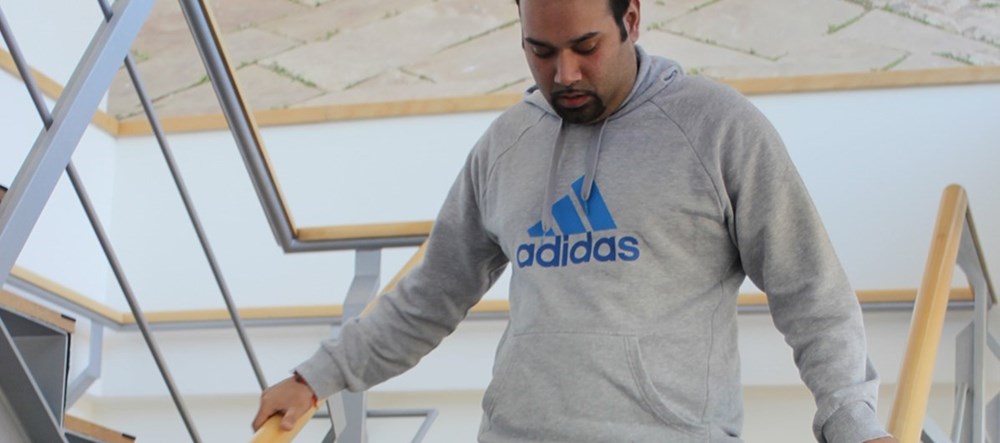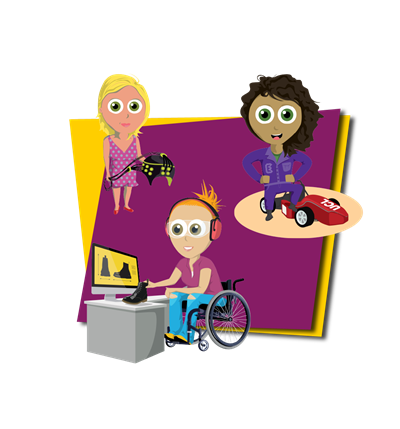Standing on new legs
As an amputee, engineering student Rishi Vegad acutely understands how engineering can make life better.

Name: Rishi Vegad
Age: 29
Job title: Aerospace Engineering student, Kingston University / placement student at MTTS Ltd and Blatchford
Qualifications: A level Maths and an AS level in Further Maths, plus an access course in Maths and Physics. Currently undertaking a Bachelor’s Degree in Engineering
Employer: N/A
Where you live: Sunbury-on-Thames, Surrey
I am a full-time student at Kingston University and I also undertake two placements at Materials Testing and Technical Services Ltd (MTTS) and Blatchford. MTTS is an expert in materials testing and Blatchford specialises in making artificial legs.
In my spare time I love swimming and Chelsea FC – I’m a season ticket holder. I also like to tinker and make things; I have an electronics kit that is really fun to experiment with.
At university, I attend lectures to learn about things as varied as mathematics and design. I also have a project as part of my degree work in which I am building a small car. I spend my time on this in the workshop, designing and then building it. This involves a lot of wiring and testing – I have a target on the wall which it should hit if it’s working well. It doesn’t always work so it’s very challenging, but lots of fun.
At MTTS it’s a lot of CAD and ‘machining’. CAD stands for Computer-Aided Design so I’m essentially learning to draw my ideas on a computer. Machining is the process of forming something out of a material. At MTTS I focus on making things out of metal. Recently I made a motorbike part, which involved learning to make very precise cuts to the exact shape needed.
At Blatchford I test a range of artificial leg parts, mainly knees and ankles. I walk around in them and give feedback on how it works and feels. I also test the ones fresh off the production line before they get sent to the customers, much like someone doing a test drive before buying a car to ensure it’s the best it can be.
As an amputee wearing an artificial leg, my life is better because of great engineering. My artificial leg means I can stay active and do the things my friends can do, so I really see the value engineers can make to the world. My leg, called the Linx, is made by Blatchford and in my placement with them I’m helping to enhance its performance so that it can further improve the lives of amputees like myself.
I grew up on the Heathrow Airport flight path so seeing airplanes fly over me every day made me curious about engines. My dad is a telecoms engineer at O2 which is very inspiring; his team are working to expand the 4G network and increase the internet signal available so people can get faster internet on their phones.
I took A level Maths and an AS level in Further Maths plus an access course in Maths and Physics. Studying science and maths gave me skills that are now critical to my every day work. I use equations that would be difficult to get along without. To me, maths is the language of physics; it’s how you describe how a force is acting on something else, which is crucial to understand in when designing technology. A Levels are a common and great way to get these skills but they aren’t the only way. A Levels don’t always work for everyone – I undertook an access course in Maths and Physics to qualify for university. For me, the access course structure enabled me to work at the same time as qualifying for university, which was great.
Some of the engineers I most admire are women. For example, Nadine Stech on the Blatchford team which makes the Linx leg. When she was 11, her teacher told her that “maths and girls don’t go together”; instead of letting that stop her it made her determined to prove him wrong. Today, not only is she working on a great piece of engineering that is improving lives, the Linx actually won the Royal Academy of Engineering MacRobert Award, the UK’s most prestigious engineering prize. It just goes to show that you shouldn’t be discouraged; the fact that there aren’t many women in the industry should just make it a greater achievement. It’s also very encouraging to see that a lot of my course mates at Kingston are women - it’s a brilliant career whether you’re a boy or a girl!
To really solve the world’s problems, which is what engineers do, passion and patience are key. With most projects, for every step of progress make, you are likely to have lots of failed attempts too. For example, the motorbike part I made at MTTS recently took around seven attempts and a full day to get right. Being passionate and curious will also help you look for solutions that others can’t see, making you better at your job.
I love the fact that engineering is everywhere we look and makes our lives better. Some great examples; bridges help connect people across distances, rocket engines can take us to space and my artificial leg means I can walk again! Even things people don’t realise are examples of great engineering. Your asthma inhaler is an important piece of medical engineering that helps you breathe and your house alarm is an example of electrical engineering that keeps you safe.
I love espionage and military technologies - if I could go back in time and invent anything it would have to be the SR71 Blackbird, a former US spy plane that travelled over three times the speed of sound over the USSR. It was designed to be faster that any missile so it wouldn’t be shot down and it flew at the edge of the atmosphere. It also looks the part; two engines that look otherworldly.
If you’re interested in studying engineering, approach universities and colleges outside of their open days. You want to go and see them in action as they teach practical skills as it’s much more useful than a general open day. Also approach companies. They want to see keen young people who sell themselves, and they’re very hospitable when it comes to showcasing their work. What’s the worst that could happen? You might get told no, but be brave, be pro-active and create your own opportunities!
